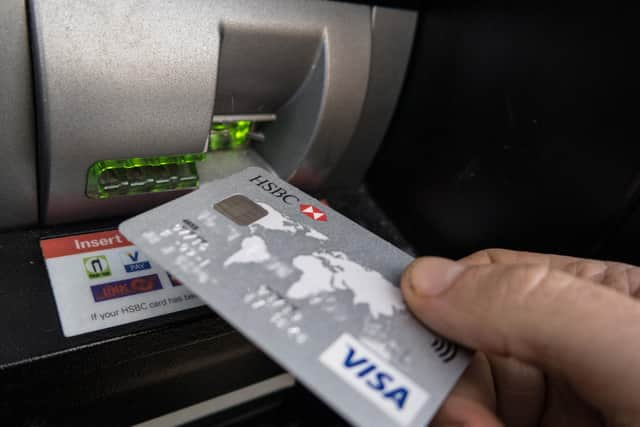Banking hubs show why branch closures shouldn't be made in haste - Jayne Dowle
The friendly First Direct advertisements and - as it turned out - even friendlier customer service was very attractive, especially after a bruising face to face encounter with a very traditional bank manager in his office at Oxford Street branch of the now-defunct Midland Bank.
My salary as a magazine junior was tiny at first and he was not impressed with the way I was managing it. Not impressed at all.
Advertisement
Hide AdAdvertisement
Hide AdHe told me sternly that if I didn’t mend my financial ways I couldn’t afford to live in London and I would have no choice but to return to Yorkshire. The thought of going home in shame was enough to spur me on; I ditched the Midland and embraced the future, in all ways.


Was I part of the problem? Is it the fault of people like me that thousands of local bank branches have closed in recent years, as we’re told that customers are moving in their droves to telephone and internet banking? Is it partly my fault also, that I use my banking apps every single day? In fact, checking my balance is the first thing I do every morning, before I even get out of bed.
Lloyds, for instance, says it now has 19.1 million online banking customers and 15.6 million mobile app users as consumers increasingly turn to digital services.
I’m giving it a lot of thought. In the same week that I’ve struggled to make a simple name change adjustment to an additional account I’ve since held with a different bank - not First Direct, I hasten to add - both online and on the telephone, we hear that in total, 25 new ‘banking hubs’ are to open across the UK, to provide in-person banking. These are targeted for communities which have suffered from bank branch closures in recent years.
Advertisement
Hide AdAdvertisement
Hide AdOne of these is in our region, at Hornsea on the East Coast, which lost NatWest and Lloyds in 2018 and has no bank branches since. Another hub will open in Barton-on-Humber in North Lincolnshire.
A banking hub is shared by a number of banks on different days of the week. Hubs feature a counter service operated by staff from the Post Office, where customers of any bank can withdraw and deposit cash, make bill payments and carry out regular banking transactions.
Hubs should also be able to offer a private room where customers can sit down and sort out their banking issues with a trained member of staff.
The ability to be able to do this is so important, as I found out this week. I’d spoken to two different customer advisers on the telephone and also struggled online to find the correct paperwork to enact the name change I wanted to make.
Advertisement
Hide AdAdvertisement
Hide AdWhen I finally rang customer services again in despair, I was told that - after all that messing around - it wasn’t something I could do over the phone or online anyway and I would “need to go into branch”.
Fuming that this would mean driving to town and taking an hour out of my busy working day, I did. And the woman who ushered me into a private room could not have been more supportive or helpful. She gave me pragmatic advice and I left vowing never to complain about having to “go into branch” again, or take the fact that there was actually still a branch, for granted.
As I pulled away from outside the bank, I caught sight of the Halifax across the road and thought of my parents. Both in their late seventies, they’ve banked with the Halifax for as long as I can remember. Neither of them trust internet banking, or download apps onto their basic phones.
If this branch ever ended up on a hit-list, they would have to travel to Meadowhall, more than 10 miles away, every time they wanted to do anything more complicated than withdrawing a bit of cash.
Advertisement
Hide AdAdvertisement
Hide AdDame Clare Moriarty, chief executive of Citizens Advice is absolutely right when she says that not being able to access banking services is detrimental, especially to the most vulnerable of citizens – the elderly, the disabled, those without access to a car and families with young children who can’t travel easily:
“It can mean a bus fare to the next town, difficulties budgeting and extra hoops to jump through to pay bills - often for those who are least able to afford it.”
I can’t help but feel that the need for these new hubs proves that despite the ongoing switch to digital banking many people - the young, especially - feel comfortable with, there is still a huge call for personal, sit-down banks in our communities. As such, the arrival of these new hubs should stand as a stark reminder that in future, not a single bank branch closure should not be done in haste.